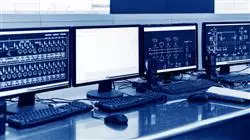University certificate
The world's largest faculty of information technology”
Introduction to the Program
This Postgraduate certificate will allow you to update your knowledge in Calculus and Numerical Methods in a practical way, 100% online, without giving up the maximum academic accuracy"

This program is aimed at those interested in achieving a higher level of knowledge in Calculus and Numerical Methods. The main objective is to enable the student to apply in the real world the knowledge acquired in the Postgraduate certificate, in a work environment that reproduces the conditions that may be encountered in the future, in a rigorous and realistic manner.
This program will prepare scientifically and technologically, as well as to develop the professional practice of software engineering, with a transversal and versatile approach adapted to the new technologies and innovations in this field. You will obtain extensive knowledge in Calculus and Numerical Methods from professionals in the sector.
The students will be able to take the opportunity and study this program in a 100% online format, without neglecting their obligations.
Learn the latest techniques and strategies with this program and achieve success as a computer engineer"
This Postgraduate certificate in Calculus and Numerical Methods contains the most complete and up-to-date program on the market. The most important features include:
- Development of 100 simulated scenarios presented by experts in Calculus and Numerical Methods
- Its graphic, schematic and eminently practical contents provide scientific and practical information on Calculus and Numerical Methods
- News on the latest advances in Calculus and Numerical Methods
- It contains practical exercises where the self-assessment process can be carried out to improve learning
- Interactive learning system based on the case method and its application to real practice
- All of this will be complemented by theoretical lessons, questions to the expert, debate forums on controversial topics, and individual reflection assignments
- Content that is accessible from any fixed or portable device with an Internet connection
Get trained in Calculus and Numerical Methods with this intensive program, from the comfort of your home"
It includes in its teaching staff professionals belonging to the field of education, who bring to this program their work experience, in addition to recognized specialists belonging to reference societies and prestigious universities.
Thanks to its multimedia content developed with the latest educational technology, this Postgraduate certificate will allow the professional a situated and contextual learning, that is to say, a simulated environment that will provide an immersive learning programmed to learn in real situations.
This program is designed around Problem-Based Learning, whereby the students must try to solve the different professional practice situations that arise throughout the program. For this purpose, the professional will be assisted by an innovative interactive video system created by renowned experts in Calculus and Numerical Methods with extensive teaching experience.
Benefit from the latest educational technology to get up to date in Calculus and Numerical Methods without leaving home"

Learn the latest techniques in Calculus and Numerical Methods from experts in the field"
Why study at TECH?
TECH is the world’s largest online university. With an impressive catalog of more than 14,000 university programs available in 11 languages, it is positioned as a leader in employability, with a 99% job placement rate. In addition, it relies on an enormous faculty of more than 6,000 professors of the highest international renown.

Study at the world's largest online university and guarantee your professional success. The future starts at TECH”
The world’s best online university according to FORBES
The prestigious Forbes magazine, specialized in business and finance, has highlighted TECH as “the world's best online university” This is what they have recently stated in an article in their digital edition in which they echo the success story of this institution, “thanks to the academic offer it provides, the selection of its teaching staff, and an innovative learning method aimed at educating the professionals of the future”
A revolutionary study method, a cutting-edge faculty and a practical focus: the key to TECH's success.
The most complete study plans on the university scene
TECH offers the most complete study plans on the university scene, with syllabuses that cover fundamental concepts and, at the same time, the main scientific advances in their specific scientific areas. In addition, these programs are continuously being updated to guarantee students the academic vanguard and the most in-demand professional skills. In this way, the university's qualifications provide its graduates with a significant advantage to propel their careers to success.
TECH offers the most comprehensive and intensive study plans on the current university scene.
A world-class teaching staff
TECH's teaching staff is made up of more than 6,000 professors with the highest international recognition. Professors, researchers and top executives of multinational companies, including Isaiah Covington, performance coach of the Boston Celtics; Magda Romanska, principal investigator at Harvard MetaLAB; Ignacio Wistumba, chairman of the department of translational molecular pathology at MD Anderson Cancer Center; and D.W. Pine, creative director of TIME magazine, among others.
Internationally renowned experts, specialized in different branches of Health, Technology, Communication and Business, form part of the TECH faculty.
A unique learning method
TECH is the first university to use Relearning in all its programs. It is the best online learning methodology, accredited with international teaching quality certifications, provided by prestigious educational agencies. In addition, this disruptive educational model is complemented with the “Case Method”, thereby setting up a unique online teaching strategy. Innovative teaching resources are also implemented, including detailed videos, infographics and interactive summaries.
TECH combines Relearning and the Case Method in all its university programs to guarantee excellent theoretical and practical learning, studying whenever and wherever you want.
The world's largest online university
TECH is the world’s largest online university. We are the largest educational institution, with the best and widest online educational catalog, one hundred percent online and covering the vast majority of areas of knowledge. We offer a large selection of our own degrees and accredited online undergraduate and postgraduate degrees. In total, more than 14,000 university degrees, in eleven different languages, make us the largest educational largest in the world.
TECH has the world's most extensive catalog of academic and official programs, available in more than 11 languages.
Google Premier Partner
The American technology giant has awarded TECH the Google Google Premier Partner badge. This award, which is only available to 3% of the world's companies, highlights the efficient, flexible and tailored experience that this university provides to students. The recognition as a Google Premier Partner not only accredits the maximum rigor, performance and investment in TECH's digital infrastructures, but also places this university as one of the world's leading technology companies.
Google has positioned TECH in the top 3% of the world's most important technology companies by awarding it its Google Premier Partner badge.
The official online university of the NBA
TECH is the official online university of the NBA. Thanks to our agreement with the biggest league in basketball, we offer our students exclusive university programs, as well as a wide variety of educational resources focused on the business of the league and other areas of the sports industry. Each program is made up of a uniquely designed syllabus and features exceptional guest hosts: professionals with a distinguished sports background who will offer their expertise on the most relevant topics.
TECH has been selected by the NBA, the world's top basketball league, as its official online university.
The top-rated university by its students
Students have positioned TECH as the world's top-rated university on the main review websites, with a highest rating of 4.9 out of 5, obtained from more than 1,000 reviews. These results consolidate TECH as the benchmark university institution at an international level, reflecting the excellence and positive impact of its educational model.” reflecting the excellence and positive impact of its educational model.”
TECH is the world’s top-rated university by its students.
Leaders in employability
TECH has managed to become the leading university in employability. 99% of its students obtain jobs in the academic field they have studied, within one year of completing any of the university's programs. A similar number achieve immediate career enhancement. All this thanks to a study methodology that bases its effectiveness on the acquisition of practical skills, which are absolutely necessary for professional development.
99% of TECH graduates find a job within a year of completing their studies.
Postgraduate Certificate in Calculus and Numerical Methods
The accelerated advance of technology in the last decade has generated a growing demand for professionals highly trained in the management of mathematical tools and advanced programming. This situation has led TECH Global University to develop the Postgraduate Certificate in Calculus and Numerical Methods. An online postgraduate Postgraduate Certificate created with the highest academic standards that will complement your studies in a dynamic and flexible way. Our teachers are Postgraduate Certificates in the field, who will provide you with personalized advice and support throughout the program. In the syllabus, carefully designed by specialists, you will find relevant aspects such as the different calculation techniques and the application of numerical algorithms to solve complex problems. In this way, you will be able to solve numerical problems in different areas of professional life.
Get unique skills in calculus and numerical methods
This Postgraduate Certificate focuses on providing you with the necessary tools to face the numerical challenges of real life. At TECH we not only work first hand with the advances in telematics and multimedia, but we have extensive experience witnessing the enormous possibilities offered by the proper handling of calculus and numerical methods. Our teachers are Postgraduate Certificates in the field, who will provide you with personalized advice and support throughout the program. We offer you quality training that will allow you to develop as a professional in an area in constant growth and demand. As you advance in your degree, you will obtain unique skills in the use of specialized software in the field of programming and numerical simulation. All this, will allow you to tackle projects in different fields of engineering, science and technology.







